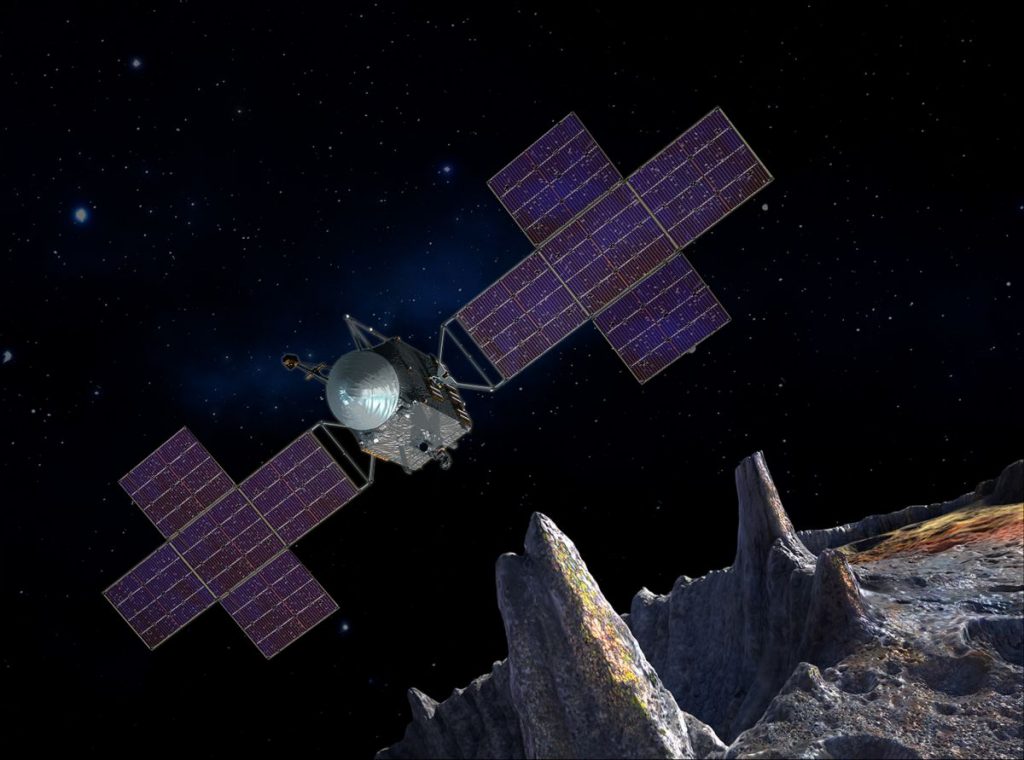NASA’s Psyche asteroid mission has pulled its head off the chopping block.
The Psyche spacecraft was supposed to launch toward its namesake, a bizarre metallic space rock in the main asteroid belt, between August and October of this year. But issues with Psyche’s flight software made it impossible to hit that window, leading NASA to announce in June that it had postponed the liftoff and initiated a “continuation/termination” review of the mission.
As that frightening term implies, cancellation was one possible outcome of the review, which was informed by a separate independent investigation commissioned by NASA and the agency’s Jet Propulsion Laboratory (JPL) in Southern California, which manages the Psyche mission.
Those panels haven’t completely wrapped up their work — the independent review team is still finalizing its report — but the verdict is in, and it’s a good one for Psyche: NASA will continue developing the mission and now targets a launch in October 2023.
“I’m extremely proud of the Psyche team,” JPL Director Laurie Leshin said in a statement on Friday (opens in new tab) (Oct. 28). “During this review, they have demonstrated significant progress already made toward the future launch date. I am confident in the plan moving forward and excited by the unique and important science this mission will return.”
Related: The greatest asteroid missions of all time!
Psyche will still launch atop a SpaceX Falcon Heavy rocket from NASA’s Kennedy Space Center in Florida, as previously planned. But the one-year delay will have consequences for the mission.
For example, a 2022 liftoff would have delivered Psyche to its asteroid target in early 2026. But a 2023 launch requires a different trajectory, pushing the arrival back to August 2029, NASA officials said.
And NASA’s Janus smallsat mission, which is designed to study two separate binary asteroid systems, now may not ride to space with Psyche, as it would have on a 2022 launch. “NASA continues to assess options” for Janus, officials wrote in Friday’s statement.
(Another ride-along, NASA’s Deep Space Optical Communications, will definitely fly with Psyche in 2023; it’s integrated into the asteroid probe.)
The delay could also have budgetary implications. The mission has a total life-cycle cost (including launch) of $985 million, $717 million of which had been spent by late June (opens in new tab). Some belt-tightening might be needed to stretch the dollars over the extra years necessitated by the new plan.
Planetary scientists around the world are doubtless raising a glass to Friday’s news, for it means they’ll still get up-close looks at one of the most intriguing objects in the solar system.
Psyche is a 140-mile-wide (225 kilometers) asteroid that appears to be made mainly of iron and nickel — a composition similar to that of Earth’s core. Many researchers therefore think it may be the exposed heart of an ancient protoplanet, whose rocky layers were stripped away by powerful impacts over the eons.
“I appreciate the hard work of the independent review board and the JPL-led team toward mission success,” Thomas Zurbuchen, associate administrator of NASA’s Science Mission Directorate in Washington, said in the same statement.
“The lessons learned from Psyche will be implemented across our entire mission portfolio,” he added. “I am excited about the science insights Psyche will provide during its lifetime and its promise to contribute to our understanding of our own planet’s core.”
Mike Wall is the author of “Out There (opens in new tab)” (Grand Central Publishing, 2018; illustrated by Karl Tate), a book about the search for alien life. Follow him on Twitter @michaeldwall (opens in new tab). Follow us on Twitter @Spacedotcom (opens in new tab) and on Facebook (opens in new tab).

